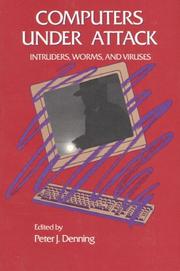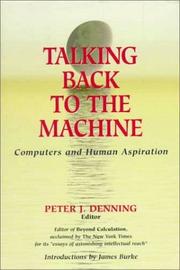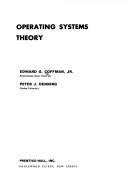| Listing 1 - 10 of 19 | << page >> |
Sort by
|

ISBN: 0201530678 9780201530674 Year: 1990 Publisher: New York, N.Y. Reading, Mass. Bonn Madrid ACM Press Addison-Wesley
Abstract | Keywords | Export | Availability | Bookmark
 Loading...
Loading...Choose an application
- Reference Manager
- EndNote
- RefWorks (Direct export to RefWorks)
Computer viruses --- Computervirussen --- Virus d'ordinateur --- Computer securities --- Virus informatiques --- Computer security --- 681.3*K65 --- 681.3*D46 --- Software viruses --- Viruses, Computer --- Computer crimes --- Malware (Computer software) --- Computer privacy --- Computer system security --- Computer systems --- Computers --- Electronic digital computers --- Security of computer systems --- Data protection --- Security systems --- Hacking --- Computerwetenschap--?*K65 --- Security and protection: access controls; authentication; cryptographic controls; information flow controls; security kernels; verification (Operating systems) --- Security measures --- 681.3*D46 Security and protection: access controls; authentication; cryptographic controls; information flow controls; security kernels; verification (Operating systems) --- Cyber security --- Cybersecurity --- Protection of computer systems --- Protection --- Computer security. --- Access control --- Computer securities. --- Computer viruses.
Book
Year: 2008 Publisher: Moffett Field, Calif. National Bureau of Economic Research
Abstract | Keywords | Export | Availability | Bookmark
 Loading...
Loading...Choose an application
- Reference Manager
- EndNote
- RefWorks (Direct export to RefWorks)
Book
Year: 1969 Publisher: New York, New York : Association for Computing Machinery,
Abstract | Keywords | Export | Availability | Bookmark
 Loading...
Loading...Choose an application
- Reference Manager
- EndNote
- RefWorks (Direct export to RefWorks)
Being busy builders, many who research operating system design principles are given little opportunity to write down their results and experience, or to meet and discuss them. Thus the unusual success of the first Symposium on Operating Systems Principles at Gatlinburg, Tennessee, in October, 1967. Thus, we hope, the success of this, the second symposium.These Proceedings constitute the permanent record of the Second Symposium on Operating Systems Principles. The papers cover a wide range of topics, including general design principles, new ideas and new approaches to old ideas, and performance evaluation.
Book
ISBN: 0262518120 0262014548 9786612899195 0262289334 1282899198 9780262289337 0262288974 9780262014540 Year: 2010 Publisher: Cambridge, Mass. : MIT Press,
Abstract | Keywords | Export | Availability | Bookmark
 Loading...
Loading...Choose an application
- Reference Manager
- EndNote
- RefWorks (Direct export to RefWorks)
Two experts show that innovation is a skill that can be learned and describe eight essential practices for achieving success.
Electronic books. -- local. --- Knowledge management. --- Technological innovations. --- Technological innovations --- Management --- Business & Economics --- Management Styles & Communication --- Management of knowledge assets --- Breakthroughs, Technological --- Innovations, Industrial --- Innovations, Technological --- Technical innovations --- Technological breakthroughs --- Technological change --- Information technology --- Intellectual capital --- Organizational learning --- Creative ability in technology --- Inventions --- Domestication of technology --- Innovation relay centers --- Research, Industrial --- Technology transfer --- Knowledge management --- E-books --- Innovatie --- Ondernemingen.
Book
ISBN: 9780262536561 9780262353410 0262353415 0262536560 Year: 2019 Publisher: Cambridge, Massachusetts : The MIT Press,
Abstract | Keywords | Export | Availability | Bookmark
 Loading...
Loading...Choose an application
- Reference Manager
- EndNote
- RefWorks (Direct export to RefWorks)
A few decades into the digital era, scientists discovered that thinking in terms of computation made possible an entirely new way of organizing scientific investigation; eventually, every field had a computational branch: computational physics, computational biology, computational sociology. More recently, "computational thinking" has become part of the K-12 curriculum. But what is computational thinking? This volume in the MIT Press Essential Knowledge series offers an accessible overview, tracing a genealogy that begins centuries before digital computers and portraying computational thinking as pioneers of computing have described it. The authors explain that computational thinking (CT) is not a set of concepts for programming; it is a way of thinking that is honed through practice: the mental skills for designing computations to do jobs for us, and for explaining and interpreting the world as a complex of information processes. Mathematically trained experts (known as "computers") who performed complex calculations as teams engaged in CT long before electronic computers. The authors identify six dimensions of today's highly developed CT--methods, machines, computing education, software engineering, computational science, and design--and cover each in a chapter. Along the way, they debunk inflated claims for CT and computation while making clear the power of CT in all its complexity and multiplicity.
Computer algorithms --- Computer logic --- Electronic data processing --- Social aspects --- Algorithmes --- Logique informatique --- Informatique --- Aspect social --- Computers --- Office practice --- ADP (Data processing) --- Automatic data processing --- Data processing --- EDP (Data processing) --- IDP (Data processing) --- Integrated data processing --- Logic, Symbolic and mathematical --- Computer science logic --- Algorithms --- Automation --- Electronic data processing - Social aspects

ISBN: 0387984135 9780387984131 Year: 1999 Publisher: New York: Copernicus,
Abstract | Keywords | Export | Availability | Bookmark
 Loading...
Loading...Choose an application
- Reference Manager
- EndNote
- RefWorks (Direct export to RefWorks)
Computers and civilization --- Prediction theory --- World Wide web
Book
Year: 1977 Publisher: New York, New York : Association for Computing Machinery,
Abstract | Keywords | Export | Availability | Bookmark
 Loading...
Loading...Choose an application
- Reference Manager
- EndNote
- RefWorks (Direct export to RefWorks)

ISBN: 0136378684 9780136378686 Year: 1973 Publisher: Englewood Cliffs (N.J.): Prentice Hall
Abstract | Keywords | Export | Availability | Bookmark
 Loading...
Loading...Choose an application
- Reference Manager
- EndNote
- RefWorks (Direct export to RefWorks)
Operating systems (Computers) --- Algorithms --- Systèmes d'exploitation (Ordinateurs) --- Algorithmes --- Computer algorithms --- Electronic digital computers --- Programming --- #TCPW P4.0 --- #TCPW P4.3 --- 681.3*D4 --- 681.3*D40 --- Computer operating systems --- Computers --- Disk operating systems --- Systems software --- Operating systems--See also {681.3*C} --- Operating systems: general --- Operating systems --- 681.3*D40 Operating systems: general --- 681.3*D4 Operating systems--See also {681.3*C} --- Systèmes d'exploitation (Ordinateurs) --- Electronic digital computers - Programming --- Operating System
Book
Year: 2015 Publisher: Cambridge, Massachusetts : [Piscataqay, New Jersey] : MIT Press, IEEE Xplore,
Abstract | Keywords | Export | Availability | Bookmark
 Loading...
Loading...Choose an application
- Reference Manager
- EndNote
- RefWorks (Direct export to RefWorks)
Computing is usually viewed as a technology field that advances at the breakneck speed of Moore's Law. If we turn away even for a moment, we might miss a game-changing technological breakthrough or an earthshaking theoretical development. This book takes a different perspective, presenting computing as a science governed by fundamental principles that span all technologies. Computer science is a science of information processes. We need a new language to describe the science, and in this book Peter Denning and Craig Martell offer the great principles framework as just such a language. This is a book about the whole of computing -- its algorithms, architectures, and designs.Denning and Martell divide the great principles of computing into six categories: communication, computation, coordination, recollection, evaluation, and design. They begin with an introduction to computing, its history, its many interactions with other fields, its domains of practice, and the structure of the great principles framework. They go on to examine the great principles in different areas: information, machines, programming, computation, memory, parallelism, queueing, and design. Finally, they apply the great principles to networking, the Internet in particular. Great Principles of Computing will be essential reading for professionals in science and engineering fields with a "computational" branch, for practitioners in computing who want overviews of less familiar areas of computer science, and for non-computer science majors who want an accessible entry way to the field.
Book
Abstract | Keywords | Export | Availability | Bookmark
 Loading...
Loading...Choose an application
- Reference Manager
- EndNote
- RefWorks (Direct export to RefWorks)
| Listing 1 - 10 of 19 | << page >> |
Sort by
|

 Search
Search Feedback
Feedback About
About Help
Help News
News